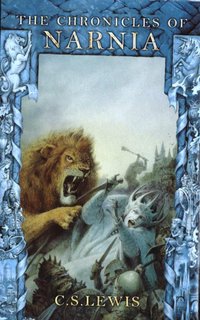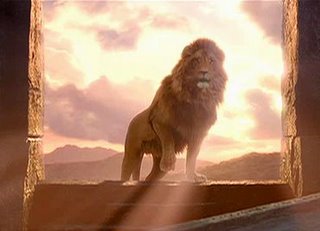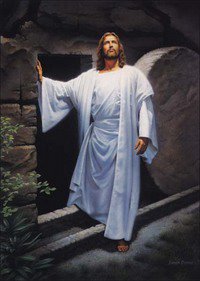
I have recently begun reading all seven books in "The Chronicles of Narnia." As you know, the upcoming movie The Lion, the Witch and the Wardrobe is based on the first and most famous book in this series. I read the series once as a kid (and have re-read a couple of the individual books several times) and remember them as these huge tomes that were thousands of pages long. But each book is only like 100 pages! Isn't that weird? With time doing its inexorable march on my brain and so on? I would agree with what "The Lion, the Witch and the Wardrobe" Director Andrew Adamson said about it in this interview: that "the books are kind of like the house that you grew up in, much smaller than you remembered."
Fair enough. But what's the deal now? Do they hold up for adults? Could they carry a movie that everyone can enjoy? And what's the deal with the Christian symbolism? Let's break it all down, all analytical style.
While the books are shorter than I remember, that's not to say they're not enjoyable to adults. I think one of the reasons I liked the books so much as a kid was that Lewis wasn't talking down to me. And for me, the books still hold up for that same reason - too much pandering to the kid audience would have drastically reduced their adult appeal. I must admit, though, that the quality of the writing isn't as great as I remember. Lewis isn't the most adroit person with the language (his writing is more "tell" than "show"). The good news is that his imagination and story-telling skills are strong enough to carry the books. So while they aren't as florid as other fantasy books, they're still charming and engrossing. And by the way, no way is Harry Potter ever coming into existence without "The Chronicles of Narnia." That etymology (children from "real world" entering alternate world through a magical door in an everyday place, etc.) is absolutely and strikingly direct.
Another thing I wanted to examine more closely upon my "adult" reading of The Chronicles was all this Christian symbolism I kept hearing about. I am no Biblical scholar, but upon further review it seems like the obvious ones - that Aslan the lion is God and/or Jesus and Jadis (aka the White Witch) is Satan - are more or less the only ones. I was looking for a little more allegory (there is some - a heaven, a creation parable, an Armageddon in the appropriately titled "The Last Battle," a withered city called Charn that could be Babylon or Sodom in "The Magician's Nephew," and a few others) but there really doesn't seem to be much else. The Christian stuff that is there, however, can be heavy-handed (SPOILER ALERT -- Aslan dying on a stone table and then coming back to life to save everyone? No between-the-lines on that one. -- END SPOILER). So maybe, from a Christian standpoint, what the books lack in symbolic richness they make up for by strongly emphasizing the ties that are there.


Hmmm...I don't see any parallels. Do you?
And Aslan, of course, is that main tie. A scholar wrote an interesting essay about this which is published here. Basically, Lewis wanted readers to love Aslan, a "lovely and terrible" lion who always helps the good guys, vanquishes the bad guys, wins entire battles by himself and essentially (directly or indirectly) controls all the action. When Aslan sends the human characters back to their home, he says something to the effect of "find me in your world as well, where I am known by a different name." This other name, given the stories' small but strong Christian parallels, would of course be God or Jesus, thus (if successful) translating the reader's affection for Aslan into a kind of Christian love. I'm not saying any of this is good or bad, by the way. Just making some observations.
Judging by the interview with the movie director above, it seems as if they're going to stay true to the book, including these Christian elements. And I hope they do. If Hollywood altered these aspects to secularize the film and make it more massively appealing (which just would NOT be the Hollywood I know), it would alter the author's vision for, and thus the fabric of, the story, not to mention the story itself. And yes, I think the story is strong enough so that everyone regardless of religious predisposition can enjoy the movie and books on their own narrative merits.
In any case, I recommend people read or re-read the book before seeing the movie. It's a fun and quick read, and remains engaging after all these years. Just don't expect "literature." I don't see a ton of Christian symbolism that I hadn't already picked up, but it's still interesting to go back and read the books more closely for that stuff.

2 comments:
I heard that C.S. Lewis and J.R. Tolkien were friends. Supposedly Lewis was a proseltyzing Christian that turned Tolkien on to the faith. My source claims that Lewis unabashedly placed Biblical allegory into his work, and successfully lobbied Tolkien to do the same with Lord of the Rings.
I also heard that they were frantic gay lovers. Like your mother!
Did I just get zinged? On Thanksgiving?
Post a Comment